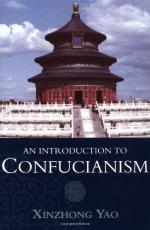|
This section contains 9,191 words (approx. 31 pages at 300 words per page) |

|
Any effort to describe Confucianism (ru, literally "weakling" but conventionally glossed as "scholar") as an object of study requires one to acknowledge that it is a historically related symbolic complex made from the fateful conjunction of early modern European and Chinese curiosity. The greater weight of the scholarly output of this conjunction has been borne by Western interpreters. The reason for this is obvious: ru was never actually a subject of conscious investigation by the Chinese until around 1900, and Confucianism is, as Lewis Hodous declared in the 1911 edition of the Encyclopedia Britannica, "a misleading general term for the teachings of the Chinese classics upon cosmology, the social order, government, morals and ethics." A celebrated case of metaphor as mistake yielded four centuries of analysis, commentary, and most importantly, translations through which Confucianism and the essential China it metonymically contained were exactingly documented for purposes...
|
This section contains 9,191 words (approx. 31 pages at 300 words per page) |

|



